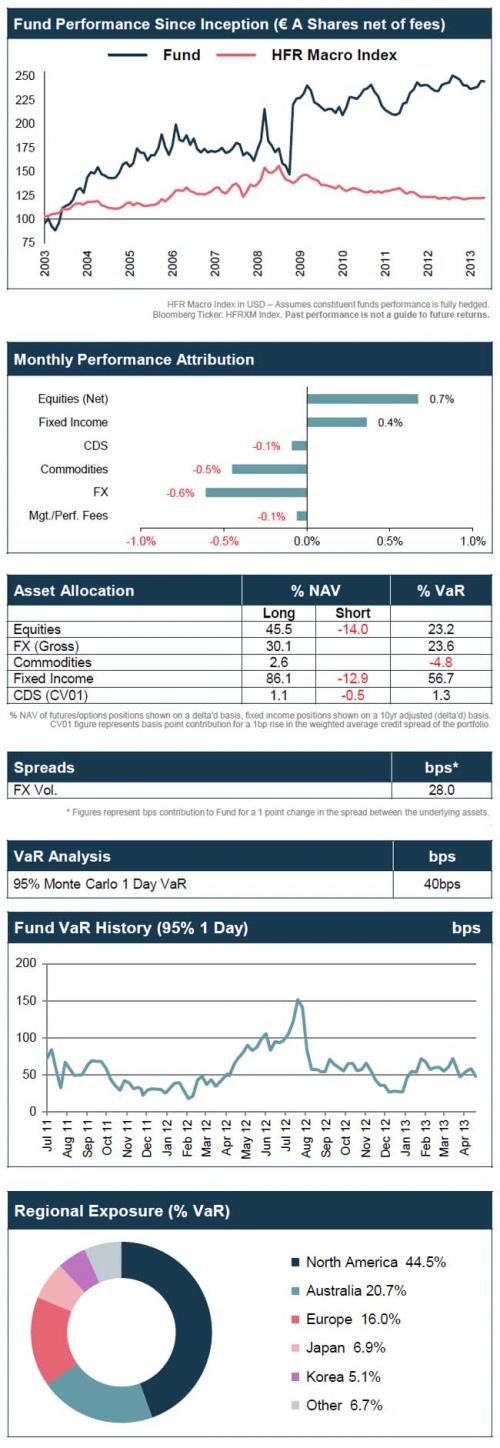From Hugh Hendry, CIO of The Eclectica Fund.
The Fund was down 18 bps in April. The main positive contributors were tobacco and Japanese equities and short-end interest ra te receivers. These gains were more than offset however by the pullback in the US dollar.
te receivers. These gains were more than offset however by the pullback in the US dollar.
We continue to maintain a long equity risk exposure through companies least exposed to the business cycle, whilst favouring receiving rates in developed countries most prone to a loss of economic momentum as other countries, notably Japan, weaken their currencies through the pursuit of QE. We also retain a structural long position in the US dollar and remain long yen assets [currency hedged] via the Japanese stock market.
Despite the near universal willingness on the part of other investors to look wistfully towards the promised resurgence in US economic growth towards the end of this year, the present reality is that the global economy has been deteriorating over the past few months, as highlighted by weaker trade activity and lower PMIs.
With a destocking cycle gaining momentum, and a revival in Japanese exports making life tougher for their overseas competition, European and emerging market economies have demonstrated evidence of further deterioration and unsurprisingly local stock markets have under-performed US indices.
Furthermore, there is growing strain developing in those commodity exporting nations that rely heavily on sales to China, Australia for one suffering from lower Chinese growth.
As China attempts its audacious switch to consumption-led growth, by allowing its currency to appreciate and so boost the purchasing power of its consumers (oblivious, it seems, to the dangers of becoming less competitive in weak export markets), the country's willingness to import boundless quantities of industrial commodities has been curtailed. As a consequence, the Australian export PMI in April contracted for the seventh consecutive month, reaching the lowest recorded level of modern times. And confronted by weaker manufacturing activity and a rising unemployment rate, the Reserve Bank of Australia cut rates to an all-time low of 2.75% last month. The Fund made 30 bps from receiving rates in Australia and we continue to expect more cuts.
As uncertainties in the global economy have increased, we have witnessed a continuation of the US economy's relative durability to the rest of the world. Stronger real GDP growth in the first quarter and positive investor perception of a re-alignment in labour, land and energy costs have combined to make US dollar assets appear more attractive than their international peers. However, our long USD position suffered a short term reversal and cost the Fund 43 bps.
Mindful of the on-going slow down in global growth we have continued to express equity risk by being long low variance equities. This strategy continues to play out positively with such stocks out-performing for the fourth month in a row. The S&P consumer staples index for instance gained 2.9% in April compared to 1.8% for the S&P500, which brings total gains since January to 17% compared with 12% for the S&P500. The Fund recorded a gain of 55 bps from tobacco stocks.
One of our core investment themes remains the fight against deflation launched by Japanese authorities through QE of historic proportions. We believe that such radical QE creates the perfect recipe for a weaker yen and booming Japanese equities. The Nikkei rallied by 11.8% in yen terms in April 2013, the best monthly return since December 2009, and has now gained 61% from the November 2012 low. Against this background, the Fund recorded a gain of 30 bps from Japanese equities.
A weak yen continues to weigh negatively however on neighbouring economies, especially Korea and Taiwan. Since its November low, the won has jumped 22% against the yen and the Taiwan dollar has appreciated by 26% over the same period, reducing the competitiveness of Korean and Taiwanese exports. Faced with a pronounced slowdown in domestic economic activity, the Korean authorities cut interest rates to 2.5% from 2.75%. The battle is now on between other Asian central banks and the BoJ! The Fund made 6 bps from the Korean rate decision and 5 bps from Korean cyclical equity shorts.
Hugh Hendry, CIO












